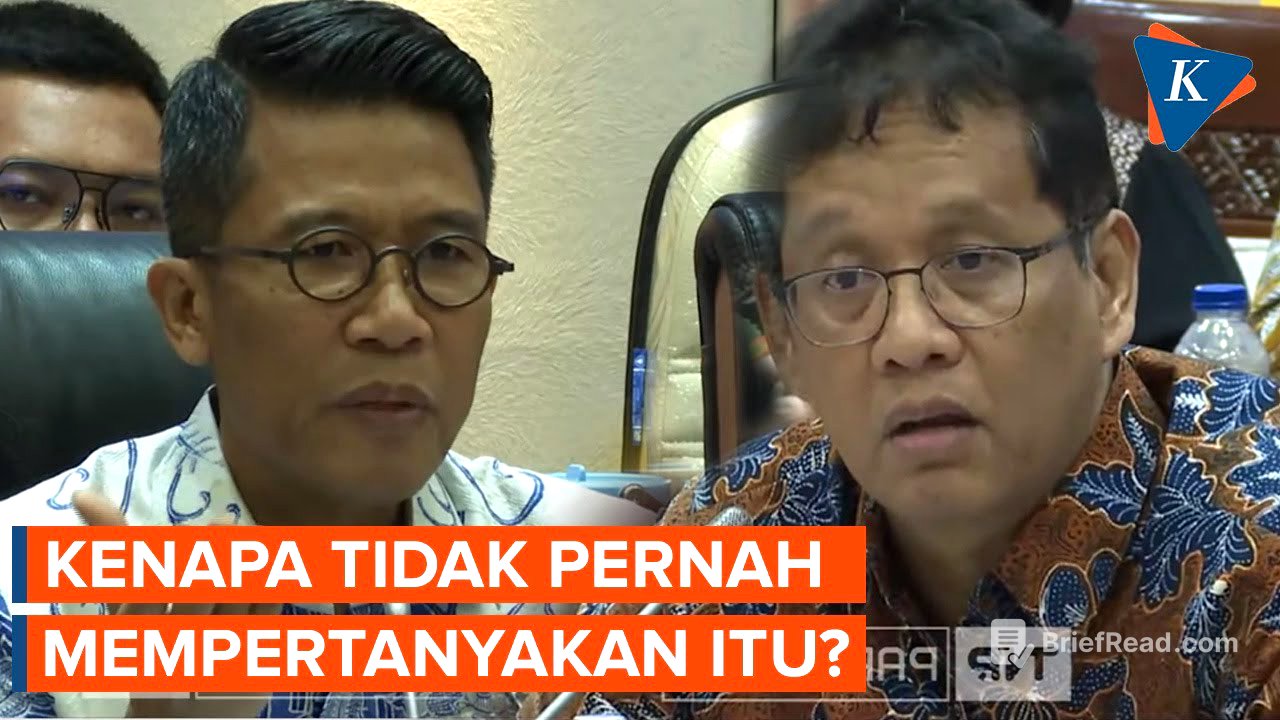TLDR;
The speaker discusses Indonesia's economic challenges, particularly stagnant growth, high interest rates, and the impact of monetary and fiscal policies. They critique past policy mistakes, such as raising interest rates excessively during the 1997-98 crisis and the economic slowdown during the COVID-19 pandemic due to incorrect policies. The speaker emphasizes the importance of maintaining liquidity, learning from past mistakes, and addressing current issues like delayed budget spending to improve the economic situation.
- Critiques Indonesia's stagnant economic growth and high interest rates.
- Highlights policy errors during the 1997-98 crisis and the COVID-19 pandemic.
- Stresses the need for maintaining liquidity and learning from past mistakes.
- Advocates for addressing delayed budget spending to improve the economy.
Economic Challenges and Policy Critiques [0:00]
The speaker begins by questioning the frequency of meetings between Commission 11 and the Minister of Finance, highlighting the design pressure on Indonesia's economy and its stagnant growth rate of 5%. They point out that neighboring countries like Vietnam and the Philippines have achieved higher growth rates. The discussion moves to the issue of debt securities to cover the deficit and the high interest rates in Indonesia, which are around 6-7%, leading to significant fiscal pressure with interest costs nearing 800 trillion Rupiah.
Monetary Policy Mistakes in 1997-98 [1:20]
The speaker reflects on the economic crisis of 1997-98, where a critical error was made by raising interest rates by over 60% to protect the Rupiah. Despite the intention of implementing a tight monetary policy, the base money supply grew by 100%, creating a chaotic situation. This policy mix led to the destruction of the real estate sector and inadvertently financed economic destruction. The speaker notes that while economists weren't necessarily incompetent, the unprecedented situation led to these mistakes.
Policy Changes After 2008 Financial Crisis [2:21]
Following the global financial meltdown in 2008, Indonesia shifted its economic policies. The speaker mentions advising on fiscal expansion in 2009 and lowering interest rates in December 2008, even as the Rupiah weakened. The strategy was to maintain liquidity to foster economic growth. The speaker observes that while lessons were learned, they tend to be forgotten over time, leading to cyclical economic patterns.
Economic Reversal and COVID-19 Pandemic Response [3:36]
The speaker notes that in 2015, under President Jokowi's administration, similar strict policies were initially implemented. They intervened to change the policy direction, which helped stabilize the economy. During the COVID-19 pandemic in 2020-2021, despite concerns about the economy collapsing, the base money growth was -15.3% in March 2000, indicating a throttling of the economy despite lowered interest rates.
Intervention and Economic Recovery During COVID-19 [4:57]
The speaker recounts being called upon to address the economic downturn during the COVID-19 pandemic. They advised reversing the policy by reducing the central bank's absorption and injecting money into the system from the fiscal side. Approximately 300 trillion Rupiah was transferred from BI to the banking system by May 2021, which increased the rate of money growth from negative to double digits, ultimately saving the economy.
Current Economic Slowdown and Policy Tightening [5:52]
The speaker observes that since mid-2023, money has been gradually absorbed downwards, leading to zero growth by the second half of 2024. This has resulted in a slowing economy and struggles in the real sector. The speaker attributes this to wrong domestic policies, as 90% of Indonesia's economy is driven by domestic demand. Despite improvements in early 2025, money growth fell again, putting the economy on hold.
Fiscal and Monetary Policy Issues [8:02]
The speaker points out that the government is late in spending the budget, with money accumulating in the central bank. This creates a dry system, as banks are keeping money in their accounts. The speaker reveals that BI has provided up to 800 trillion Rupiah, and the government has held over 500 trillion Rupiah in the central bank. This drought in the system has led to economic pressure and demonstrations.
Addressing Policy Mistakes and Future Actions [9:33]
The speaker reiterates the need to question the effectiveness of meetings between Commission 11 and the Minister of Finance. Moving forward, the speaker aims to correct these policy mistakes before making other changes. The immediate goal is to reverse the worsening conditions caused by these missteps, primarily by speeding up budget spending, though they acknowledge it's not a simple task.









